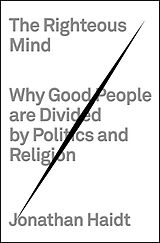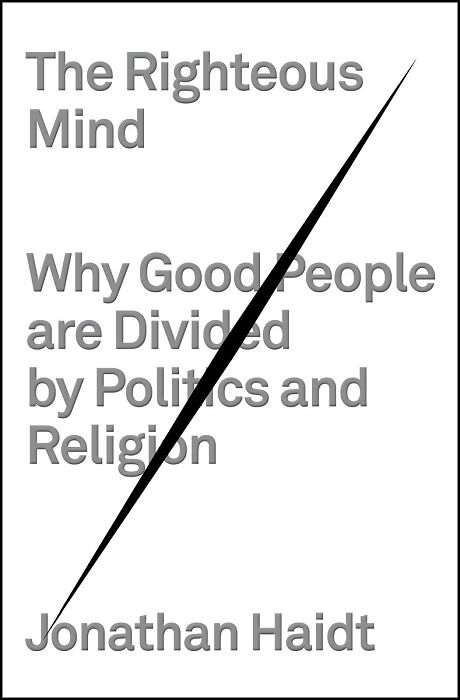The Righteous Mind
Einband:
Fester Einband
EAN:
9780307377906
Untertitel:
Why Good People Are Divided by Religion and Politics
Genre:
Religion & Theologie
Autor:
Jonathan Haidt
Herausgeber:
Knopf Doubleday Publishing Group
Anzahl Seiten:
448
Erscheinungsdatum:
13.03.2012
ISBN:
0307377903
Zusatztext 77573649 Informationen zum Autor Jonathan Haidt is the Thomas Cooley Professor of Ethical Leadership at New York University's Stern School of Business. He is the author of The Happiness Hypothesis: Finding Modern Truth in Ancient Wisdom . He lives in New York City. Klappentext Why can't our political leaders work together as threats loom and problems mount? Why do people so readily assume the worst about the motives of their fellow citizens? In The Righteous Mind, social psychologist Jonathan Haidt explores the origins of our divisions and points the way forward to mutual understanding. His starting point is moral intuition-the nearly instantaneous perceptions we all have about other people and the things they do. These intuitions feel like self-evident truths, making us righteously certain that those who see things differently are wrong. Haidt shows us how these intuitions differ across cultures, including the cultures of the political left and right. He blends his own research findings with those of anthropologists, historians, and other psychologists to draw a map of the moral domain, and he explains why conservatives can navigate that map more skillfully than can liberals. He then examines the origins of morality, overturning the view that evolution made us fundamentally selfish creatures. But rather than arguing that we are innately altruistic, he makes a more subtle claim-that we are fundamentally groupish. It is our groupishness, he explains, that leads to our greatest joys, our religious divisions, and our political affiliations. In a stunning final chapter on ideology and civility, Haidt shows what each side is right about, and why we need the insights of liberals, conservatives, and libertarians to flourish as a nation. Introduction Can we all get along? That appeal was made famous on May 1, 1992, by Rodney King, a black man who had been beaten nearly to death by four Los Angeles police officers a year earlier. The entire nation had seen a videotape of the beating, so when a jury failed to convict the officers, their acquittal triggered widespread outrage and six days of rioting in Los Angeles. Fifty-three people were killed and more than seven thousand buildings were torched. Much of the mayhem was carried live; news cameras tracked the action from helicopters circling overhead. After a particularly horrific act of violence against a white truck driver, King was moved to make his appeal for peace. King's appeal is now so overused that it has become cultural kitsch, a catchphrase1 more often said for laughs than as a serious plea for mutual understanding. I therefore hesitated to use King's words as the opening line of this book, but I decided to go ahead, for two reasons. The first is because most Americans nowadays are asking King's question not about race relations but about political relations and the collapse of cooperation across party lines. Many Americans feel as though the nightly news from Washington is being sent to us from helicopters circling over the city, delivering dispatches from the war zone. The second reason I decided to open this book with an overused phrase is because King followed it up with something lovely, something rarely quoted. As he stumbled through his television interview, fighting back tears and often repeating himself, he found these words: Please, we can get along here. We all can get along. I mean, we're all stuck here for a while. Let's try to work it out. This book is about why it's so hard for us to get along. We are indeed all stuck here for a while, so let's at least do what we can to understand why we are so easily divided into hostile groups, each one certain of its righteousness. ### People who devote their lives to studying something often come to believe that the object of their fascination is the key to understanding everything. ...
ldquo;Haidt is looking for more than victory. He’s looking for wisdom. That’s what makes The Righteous Mind well worth reading…a landmark contribution to humanity’s understanding of itself.” –New York Times Book Review
“Jonathan Haidt is one of smartest and most creative psychologists alive, and his newest book, The Righteous Mind, is a tour de force—a brave, brilliant and eloquent exploration of the most important issues of our time. It will challenge the way you think about liberals and conservatives, atheism and religion, good and evil. This is the book that everyone will be talking about.”—Paul Bloom, Yale University, Author of How Pleasure Works
“As a fellow who listens to heated political debate daily, I was fascinated, enlightened, and even amused by Haidt's brilliant insights. This penetrating yet accessible book will help readers understand the righteous minds that inhabit politics.” —Larry Sabato, University of Virginia, author of A More Perfect Constitution
“A remarkable and original synthesis of social psychology, political analysis, and moral reasoning that reflects the best of sciences in these fields and adds evidence that we are innately capable of the decency and righteousness needed for societies to survive.” —Edward O. Wilson, University Research Professor Emeritus, Harvard University
“Here is the first attempt to give an in depth analysis of the underlying moral stance and dispositions of liberals and conservatives. I couldn't put it down and discovered things about myself!” —Michael Gazzaniga, University of California, Santa Barbara, author of The Ethical Brain
“Haidt’s a good thing.” –The Atlantic online
“A well-informed tour of contemporary moral psychology…A cogent rendering of a moral universe of fertile complexity and latent flexibility.” –Kirkus
“[Haidt’s] framework for the different moral universes of liberals and conservatives struck me as a brilliant breakthrough…The Righteous Mind provides an invaluable road map.” –Miller-McCune.com
“A much-needed voice of moral sanity.” –Booklist
"An important and timely book…His ideas are controversial but they make you think…Haidt has made his reputation as a social psychologist at the University of Virginia, where he and his colleagues explore reason and intuition, why people disagree so passionately and how the moral mind works." —Bill Moyers, Moyers & Company
“Highly readable, highly insightful…The principal posture in which one envisions him is that of a scrappy, voluble, discerning patriot standing between the warring factions in American politics urging each to see the other’s viewpoint, to stop demonizing, bashing, clobbering…Haidt’s real contribution, in my judgment, is inviting us all to sit at the table.” –Washington Times
“Haidt's work feels particularly relevant now…The Righteous Mind isn't just election-year reading. Haidt's perspective can help us better understand our own political and religious leanings.” –San Francisco Chronicle
“Ingenious prose…Beautifully written, Haidt’s book shines a new and creative light on moral psychology and presents a provocative message.” –Science
"A profound discussion of the diverse psychological roots of morality and their role in producing political conflicts. It's not too much to hope that the book will help to reduce those conflicts." —Richard E. Nisbett, University of Michigan, author of The Geography of Thought
"The Righteous Mind refutes the 'New Atheist…

Leider konnten wir für diesen Artikel keine Preise ermitteln ...
billigbuch.ch sucht jetzt für Sie die besten Angebote ...
Die aktuellen Verkaufspreise von 6 Onlineshops werden in Realtime abgefragt.
Sie können das gewünschte Produkt anschliessend direkt beim Anbieter Ihrer Wahl bestellen.
Loading...
Die aktuellen Verkaufspreise von 6 Onlineshops werden in Realtime abgefragt.
Sie können das gewünschte Produkt anschliessend direkt beim Anbieter Ihrer Wahl bestellen.
| # | Onlineshop | Preis CHF | Versand CHF | Total CHF | ||
|---|---|---|---|---|---|---|
| 1 | Seller | 0.00 | 0.00 | 0.00 |
